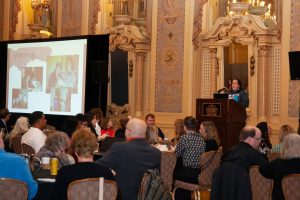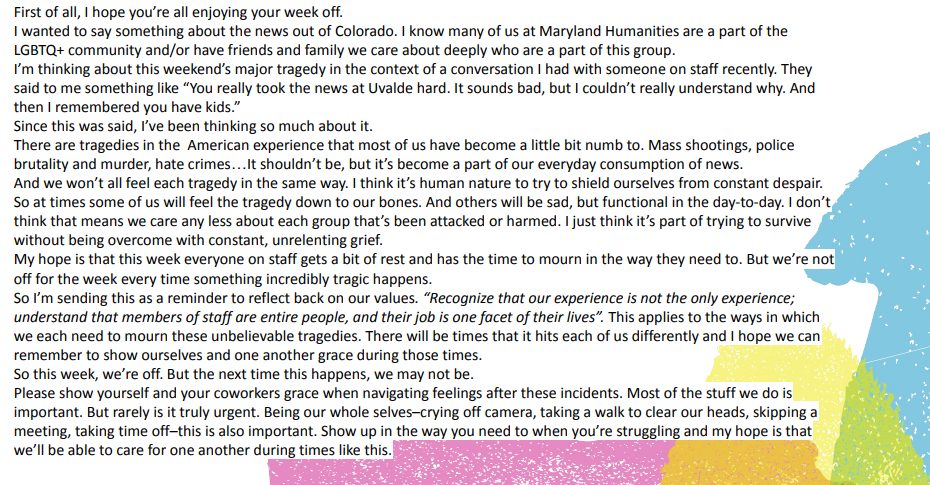“What would it look like if we took steps daily to care for ourselves and our colleagues in the same way as we do for the objects in our care?” This winter, Executive Director Lindsey Baker gave the keynote at the Small Museum Association Conference. The conference theme: “Creating a Culture of Care.” She talks about her experience giving the address.

Many of my 20+ internships, fellowships, and part-time work gigs with small museums during my undergraduate and graduate school days were unpaid. I had to subsidize them working additional jobs. After receiving my Master’s Degree, I became Executive Director of a tiny historical society. I believed in the work and the importance of local history so deeply, that I often caught myself working 12+ hour days trying to get it all done at an organization with 1.5 staff (and a robust volunteer program).
This type of over dedication is the norm for museum work. Professional museum jobs are few and far between with many museum professionals struggling to find paid work. Once we do, we often work above and beyond any normal expectations because we believe in the mission so strongly and we know we are “lucky” to have our job.
I know firsthand the many ways small museum people put themselves last on the list of things to prioritize, working for low pay and extremely long hours. Being asked to do the jobs of multiple people, working weekends and evenings year after year, and doing it all for boards who may not fully understand the field or your work.

Within this often isolating context, many small museum people find comfort and joy when given the opportunity to spend time with their colleagues. The Small Museum Association (SMA) Annual Conference is one of the best opportunities for that type of community building in our region. I first attended SMA when I was an undergraduate at Goucher College. I was hooked. Since my first year attending, I have been a regular attendee–presenting more times than I can count, serving on the Conference Committee and later on the Board of Directors. SMA drew me back year after year because these people understood my day to day work life in a way that no one else could. We consoled one another, lifted one another up, and worked to figure out how to create experiences at our organizations that brought our respective communities together.
In all my years attending, I never thought I’d be standing on the stage giving the keynote. What special expertise did I have beyond my colleagues?
Well, I was wrong. There was something radical I was doing in my work–prioritizing the humanity of my staff at Maryland Humanities.
When Will Roulett, SMA’s Conference Chair, asked me to give the keynote address at the 2023 Conference, he asked me to speak to the conference theme, “Creating a Culture of Care.” He wanted me to talk about the work I’ve been loudly doing at Maryland Humanities in centering the wellbeing and humanity of our staff.
I was thrilled to be asked to speak about this topic. I spent months thinking through how I could focus this talk and draw from personal experience.
I called my speech “Prioritizing Joy and Showing Grace: A Small Museum Call to Action.” I wanted to challenge small museum folks—paid staff, volunteers, board members, and funders—to lead the way in prioritizing caring for small museum workers.
At the beginning of my speech, I asked “What would it look like if we took steps daily to care for ourselves and our colleagues in the same way as we do for the objects in our care?” I talked about how when we show grace helps us push back against some of white supremacy’s key characteristics like fear, urgency, prioritizing individual progress and quantity, and the binary.
Two parts of the speech seemed to strike the audience the most. I started out by telling the story of a boss who took care of me when my dad died. She told me to go lay down on the floor in a specific bedroom tucked behind a large bed, safe and secure where visitors could not see me. I remember doing so and just letting the tears come out in my own little safe space. I am still so thankful for this memory of the early prioritization of my own humanity that helped shape my feelings about our work and how we bring ourselves to it. Sharing it with this large audience, I realized how important this simple gesture was on her part.
In another part of the talk, I wanted to show the audience the practical part of how we show grace in an organization. I shared a screenshot of a Slack message I sent to staff after another mass shooting.

I paused to let the audience read the message. I chose not to read it aloud because I knew if I did the tears would flow in a way that prevented me from continuing.
I included this transparent and vulnerable image to show how I try to treat my staff as whole people and allow them to take care of themselves when and how they need.
SMA is nothing if not full of professionals looking for practical tips. To that end, I included policies and procedures into the talk, including my personal favorite, our snow day policy. I know it’s hard to think through how to actually apply these concepts, but honestly, that is the most important part.
The reaction from the talk was very validating. Afterwards, many people came up to me to share their experiences and how it resonated with them. Others still send me expressive texts, emails, and LinkedIn messages saying that the talk validated their experiences. I had clearly struck a nerve. Seeing the response reinforced the urgency in how much our field needs to start taking care of themselves.
This was a call to action. I hope the friends and partners I’ve “grown up” with over the years at SMA are able to join me in finding ways to prioritize themselves and their colleagues. I will continue to push for our field to do better. If you’re interested in hearing more, you can always follow me on LinkedIn where I am living my best life talking all things workplace culture.

